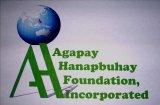
General Policies
Livelihood is defined as a means of living, and the capabilities, assets, and activities required for it. A livelihood encompasses income, as well as social institutions, gender relations,and property rights required to support and sustain a certain standard of living. It also includes access to and benefits derived from social and public services provided by the state, such as education, health services, and other infrastructure.
Sustainable livelihood programs seek to create long-lasting solutions to poverty by empowering the Agapay Hanapbuhay Foundation, Inc. target population and addressing focus, approach, and target audience, although many of them:
- Provide unemployed with salaried jobs and other opportunities to earn income;
- Provide financial services and related small scale businesses;
- Develop institutions, alliances, and networks for unemployed to advance their economic interests; and
- Promote policy and social changes that improve young people's livelihood projects.
Microfinance programs can help the poor manage their financial affairs and access financial services that are otherwise unavailable in the regular commercial sector. Traditional microfinance programs can help unemployed that improve their economic status and prospects.
Beneficiaries
The beneficiary of this foundation is referring to the service of society through helping poor and unemployed members of our society. We work for the benefit and welfare of its members and immediate members of their family and other less privileged individuals and their families. These may include but not limited to the following:
- Children in need of special protection, ex. Children in conflict with the law.
- Out-of-school youth and other with special needs.
- Indigenous group/s.
·